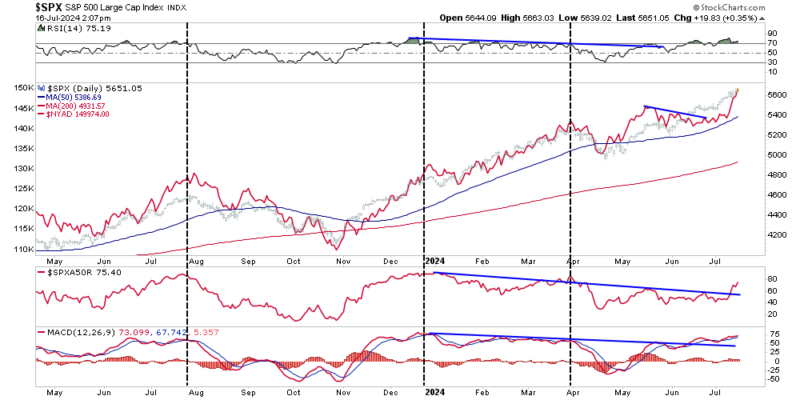Found 1,869 search results for keyword: label
The Bull Market – Could It Just Be Getting Started?
We noted last Friday that over the previous few years, a handful of “Mega-Capitalization” (mega-market capitalization) stocks have dominated market returns and driven the bull market. In that article, we questioned whether the dominance of just a handful of stocks can continue to drive the bull market. Furthermore, the breadth of the bull market rally has remained a vital concern of the bulls.
Read More »
Read More »
The 1866 civil rights revolution
The phrase “equality of opportunity” is expressed by the Civil Rights Act of 1964 as a nondiscrimination principle. There has been much debate on whether the nondiscrimination principle is a formal right to equality before the law, reflecting the principle that everyone has a right not to be discriminated against, or whether it is a substantive right vested in specified groups (e.g., blacks or women) to give them special legal protection that...
Read More »
Read More »
Die Börse rätselt jetzt: DJE-plusNews Juli 2024 mit Mario Künzel
Marketing-Anzeige #börse #mieten #inflation
Bisher haben die Weltbörsen in diesem Jahr hauptsächlich die Politik der amerikanischen Zentralbank und die wirtschaftliche Entwicklung in den USA im Blick gehabt. In letzter Zeit war es jedoch schwierig, sich zu orientieren, da die amerikanische Notenbank immer wieder betonte, dass ihre Politik datenorientiert sei. Tatsächlich waren die Konjunkturdaten in den USA jedoch sehr gemischt, was eine klare...
Read More »
Read More »
Rückblick und Ausblick 2024: Webkonferenz mit Dr. Jens Ehrhardt und Markus Koch
Wachstumsaktien, Leitzinsen, Wahljahr
In der DJE-Webkonferenz mit Dr. Jens Ehrhardt und Markus Koch besprechen die beiden Börsengrößen das erste Halbjahr an den Kapitalmärkten. Von den großen Zugpferden wie Nvidia über die Zinsentwicklungen in Europa und den USA bis hin zu den wegweisenden Wahlen in Frankreich und Amerika – kein wichtiges Thema wird ausgelassen. Auch alle Assetklassen nehmen beide Stück für Stück unter die Lupe und sondieren die...
Read More »
Read More »
The Limitations of Economic Laws
A quotation from Die Transvaler in 1958, cited by Walter E. Williams in his book “South Africa’s War Against Capitalism,” illustrates a widespread misunderstanding about the nature and purpose of the laws of economics. The political choice to be made by Afrikaner nationalists during the apartheid years was whether to pay a price in terms of economic progress by rejecting free markets, freedom of association and contractual freedom as a trade-off...
Read More »
Read More »
DJE Kapital AG: Das Börsen-Erfolgsgeheimnis von Dr. Jens Ehrhardt und seinem Team
Als eine der erfahrensten Vermögensverwalter und Fondsgesellschaften im deutschsprachigen Europa setzt die DJE Kapital AG Maßstäbe in der Vermögensverwaltung und bei Fonds. Das hauseigene Research und der DJE-spezifische Investmentansatz sind das Herzstück von DJE und Basis für eine wertorientierte, risikobewusste Anlagepolitik.
► Webseite: https://www.dje.de
► Podcast: https://spoti.fi/3AaB1mr
► Impressum: https://www.dje.de/impressum/
Seit...
Read More »
Read More »
Economic freedom: Politics, of course, by its nature is always the pursuit of the Left
Share this article
Article II of II, by Claudio Grass
Collectivism is extremely versatile and very easy for political animals to “sell” to the public and to weaponize. Politics, of course, by its nature is always the pursuit of the Left, if we are to follow strict definitions. It seeks to influence and coerce others and it abhors individual liberties and self-determination. What we know as far-right is national socialism and the rest is...
Read More »
Read More »
Die Enttäuschung zum Vorteil genutzt: DJE-plusNews Mai 2024 mit Mario Künzel
Marketing-Anzeige #aktienmarkt #dax
Die anfänglichen Erwartungen für das Jahr 2023 sahen bis zu 7 #Zinssenkungen in den USA vor, gefolgt von einer zeitverzögerten Umsetzung in Europa. Doch bis heute wurden von den jeweiligen Notenbanken keine einzige Zinssenkung vorgenommen. Diese unerwartete Entwicklung ist jedoch den Aktienmärkten zugutekommen, die trotz der Enttäuschung immer wieder neue Höchststände im Jahr 2024 erreicht haben.
Ein...
Read More »
Read More »
Defending Gaza (II): Israel Indicted, Palestinians Validated In Fact, Law & Hoppean Argumentation
Israel is engaged in the mother of all performative contradictions: denying genocide, while committing genocide, all the while demanding the right to genocide.The Jewish State is genocidal not because it has been denounced as “genocidal” by ostensible “antisemites” and “terrorist sympathizers,” but by virtue of its actions. Israel is genocidal by virtue of what it has done to Gaza, the people and their land.Shortly after October 7, 2023,...
Read More »
Read More »
With the Assange Guilty Plea, the US Government Further Destroys the Rule of Law
A long battle surrounding Julian Assange has finally come to an end. Founder of divisive group, Wikileaks, Julian would gain popularity in 2010 when helping former US soldier, Chelsea Manning uncover and spread evidence that the United States and Australia committed war crimes in Iraq and Afghanistan. Julian would also be charged with sexual assault by Sweden in 2010, a charge which would be disputed and later dropped. In 2012, following this...
Read More »
Read More »
Marktausblick Mit Stefan Breintner und Markus Koch Juni 2024
#Europa hat die #Zinsen gesenkt: Was das für #Anleger heißt und welche Entwicklungen sie potenziell erwarten können, ist auch abhängig von der Entscheidung der US-Notenbank. Angesichts noch immer unsicherer Wirtschaftsdaten bleibt unklar, welchen Kurs die USA genau einschlagen werden.
Im aktuellen #Marktausblick bespricht Stefan Breintner, Leiter Research, mit dem Moderator die jüngsten Zinsschritte von Kanada und Europa sowie die weiteren...
Read More »
Read More »
Lysander Spooner’s Flawed War on Poverty
One of the most legendary figures in the history of the liberty movement was Lysander Spooner (1808–87), a Massachusetts-based lawyer, writer, and political theorist. He is particularly well known for his abolitionism, rejection of social contract theory, and belief in natural law. Unfortunately neglected, however, are his economic writings, including among them Poverty: Its Illegal Causes and Legal Cure and Universal Wealth Shown to Be Easily...
Read More »
Read More »
Ein halbes Jahrhundert Firmengeschichte – Dr. Jens Ehrhardt & DJE werden 50 Jahre alt
Von seiner Geburt in Hamburg während des Zweiten Weltkriegs über die Anfänge der DJE Kapital AG bis hin zu seinem heutigen Arbeitsalltag das inspirierende Leben von Dr. Jens Ehrhardt zeichnet der Produzent Bernd Heller in der Dokumentation zum 50-jährigen Jubiläum der DJE das inspirierende Leben Dr. Jens Erhardts ab. Als Deutschlands erster Vermögensverwalter legte Dr. Jens Erhardt 1987 mit dem FMM-Fonds einen eigenen Aktienfonds auf. Bis heute...
Read More »
Read More »
‘Balancing growth and sustainability is the challenge of the century for the tourism sector’
In 2024, the tourism and travel industry is expected to reach, or even exceed, pre-pandemic levels. Francisco Betti is the co-author of a report on world tourism for the World Economic Forum (WEF). He believes firmly in the key role of technological progress in making the sector sustainable in the next 20 years.
Read More »
Read More »
Caitlin Clark, Bullying and the Business of Basketball
Why do people watch sports? My mother believes it’s because “people want to be uplifted.” This may explain why many are upset about how basketball phenom Caitlin Clark, who broke the National Collegiate Athletic Association (NCAA) women’s and men’s scoring records, is being treated—or mistreated—in the Women’s National Basketball Association (WNBA).
Read More »
Read More »
The American Empire
[The following is a condensation of Garet Garrett’s pamphlet The Rise of Empire, published in 1952, and included in his collection The People’s Pottage (Caldwell, ID: Caxton Printers, 1953).]We have crossed the boundary that lies between Republic and Empire. If you ask when, the answer is that you cannot make a single stroke between day and night; the precise moment does not matter. There was no painted sign to say: “You now are entering Imperium.”...
Read More »
Read More »
Private Property Comes from Scarcity, Not Law
Property is a key economic principle for markets to operate and their participants to live in harmony with one another. But as with so many things in the modern age, the scene (and accompanying meme) from the 1987 movie The Princess Bride applies: “You keep using that word; I do not think it means what you think it means.”To the Marxian, property means unjust hoarding of resources. Most Americans think of their houses. To Murray Rothbard and many...
Read More »
Read More »
Understanding the Montaigne Fallacy
With the world moving more and more in the direction of trade protectionism and war, it is worth remembering the origin of the fallacies upon which this movement is based.Michel Montaigne, the sixteenth-century minor politician and writer, is credited with the illogical view that trade and exchange result in one person winning and the other losing.
Read More »
Read More »
Migros moves ahead with downsizing plans
Migros is slimming down further. A buyer has been found for Melectronics, the Group announced on Tuesday. The retailer also intends to divest further subsidiaries. This will result in additional redundancies.
Read More »
Read More »
A Critique of Latin American Neocons
In attempting to counter Marxists, some libertarians inadvertently align themselves with statist institutions and support immoral war efforts. This concession to evil contradicts the foundational principles laid out by authors like Murray Rothbard and should be challenged.A couple of months ago, I heard such a naïve perspective from an Argentinian libertarian in an X Spaces, reflective of a broader trend within the libertarian liberty movement....
Read More »
Read More »





























